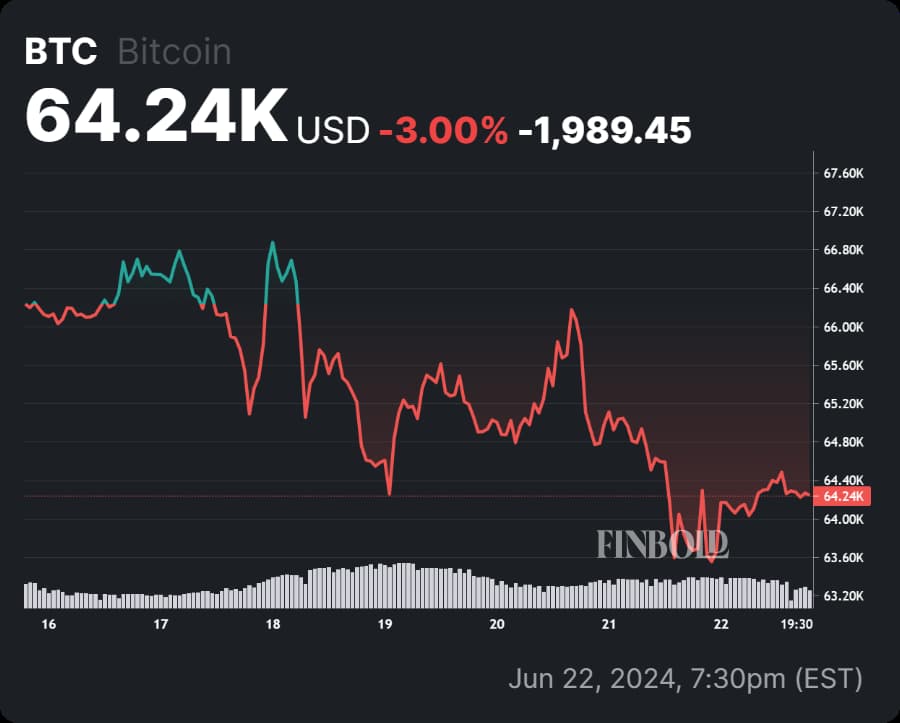The wider cryptocurrency market has recently been marked by substantial volatility. June started strong, but by the second week, investor sentiment shifted dramatically from optimism to caution, with Bitcoin (BTC) experiencing a period of consolidation, hovering above $63,000 after facing resistance at the $70,000 mark.
A report from QCP Capital indicates that Bitcoin’s price consolidation is likely to continue for the next two months, with a potential bull run not expected until late 2024.
Despite some positive developments, the price action remains weak, with BTC trading as low as $64,300.
Short-Term price cap
Bitcoin price is expected to remain constrained in the near term, according to QCP Capital. Recent trading activity shows substantial selling of Bitcoin call options set to expire next month, indicating that traders do not expect significant price movement in the immediate future.
However, there has been aggressive buying of call options for September through December, suggesting that investors anticipate major price movements later in the year.
This behavior reflects a belief in summer consolidation followed by significant market movements around the US elections, a period historically marked by volatility in financial markets.
Miner activity and broader market sentiment
Miners have been under intense pressure to sell due to high breakeven prices following the recent Bitcoin halving.
This selling pressure is expected to continue, delaying any significant price recovery. Miner BTC holdings have dropped to their lowest levels in 14 years, with total reserves decreasing by over 50,000 BTC since the start of the year, while over-the-counter (OTC) selling activity has surged.
This reduction in miner holdings indicates a continuous supply of Bitcoin entering the market, which can suppress price growth.
The market has also been unsettled by reports of a new large supply of Bitcoin entering the market. Earlier this week, the German government sold 3,000 BTC and plans to offload an additional 47,000 BTC in the coming days.
This unexpected influx of Bitcoin has added downward pressure on the price. When large amounts of Bitcoin are suddenly introduced into the market, it can create panic or a rush to sell, further depressing prices. Traders and investors need to be aware of such events as they can lead to short-term volatility and price drops.
ETF market sell-off
There has been continuous sell-off pressure from the exchange-traded funds (ETFs) market as well. Spot Bitcoin ETFs have seen outflows of more than $500 million over the past week. This trend suggests a lack of confidence among institutional investors, who are likely waiting for clearer signs of a price reversal before re-entering the market.
Institutional sell-offs can exacerbate price declines and delay recovery.
Despite the bearish sentiment, there have been several positive developments contributing to a bullish outlook for Bitcoin. MicroStrategy (NASDAQ: MSTR) recently purchased 11,931 BTC valued at approximately $800 million.
Additionally, BitMEX CEO Arthur Hayes has shared a macroeconomic narrative, suggesting that the current Japanese banking crisis could trigger a BTC bull run. Such endorsements and significant investments can indeed boost market confidence.

At press time, Bitcoin is trading at $64,240, marking a 0.79% gain in the last 24 hours and a 3% drop over the past seven days, with an accumulated loss of 7% on its monthly chart.
While the current market conditions point to a delayed Bitcoin bull run, with significant bullish movement anticipated by the end of the year, analysts also predicted that the consolidation phase may last until September 2024. Historical data suggests that after an initial drop, Bitcoin often enters a consolidation phase lasting up to 150 days, crucial for stabilizing the market and setting the stage for the next bullish breakout.
Disclaimer: The content on this site should not be considered investment advice. Investing is speculative. When investing, your capital is at risk.





